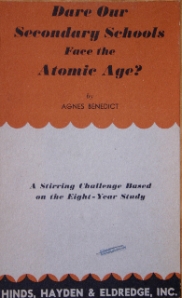This is a cross-post from Chip's Journey. It connects with Amy Shuffelton's very interesting post below about testing children. I share her daughter's evaluation of the whole process.
For too long, US education policies have defined progress in terms of student test scores, while ignoring the things that really matter. We've operated on the misguided belief that "learning the basics" is best accomplished by a narrow skills focus and micro-management of test scores.
This occurs despite the fact that few of us would be satisfied if our children could successfully answer multiple-choice questions, but failed to develop intellectual curiosity, cultural awareness, practical skills, a philosophy of life, a strong moral character, emotional balance, social fitness, sensitivity to social problems, or physical fitness. What a tragedy then, if the focus on skills per se (as with the failed No Child Left Behind Act) were not even necessary. What if one could help the whole child develop, including teaching basic skills? What if our current irrational obsession with testing actually stood in the way of the things we truly value?
 The start of a new administration in Washington is a good time to ask whether we have the schools we need. Above all, it's not a time to seek ever-more efficient means to produce incremental gains in test scores.
The start of a new administration in Washington is a good time to ask whether we have the schools we need. Above all, it's not a time to seek ever-more efficient means to produce incremental gains in test scores.We have an alternative to that in our own history. One of the best program evaluation studies ever conducted was the Eight-Year Study, research conducted between 1932 to 1940 by the Progressive Education Association (PEA). Thirty high schools participated. Instead of narrowly-defined subjects, there were broad themes of significance to the students. "The starting point of the curriculum would be life as the student saw it" (Benedict, 1947, p. 14). Moreover, the schools were community-based. "The schools believed they belonged to the citizens of the community" (ibid, p. 17).
The students from the experimental schools did only slightly better on standardized test scores, but they showed major improvement in other areas, including intellectual competence, cultural development, practical competence, philosophy of life, character traits, emotional balance, social fitness, sensitivity to social problems, and physical fitness. Students from the most progressive schools showed the most improvement, more than those in the somewhat-progressive schools, and much more than those in traditional schools.
Outcomes of the study included better forms of student assessment, innovative research techniques, new ideas for curriculum, instruction, and teacher education. But above all, it provided an answer to the questions above: It is possible to help the whole child develop, without losing basic skills. In fact, schooling can be conceived in such a way that teachers and community members are learners as well. Doing that appears to be the best way to help the individual learner, not drilling on perceived deficits, as we do now. And yes, the irrational obsession with testing actually stands in the way of teaching the things almost every parent, teacher, or citizen truly value.
References
Aikin, Wilford (1942). The story of the eight-year study. New York: Harper.
Benedict, Agnes E. (1947). Dare our secondary schools face the atomic age? . New York: Hinds, Hayden & Eldredge.


